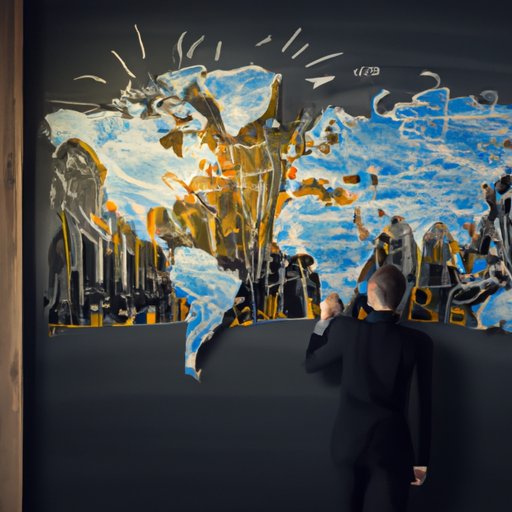Introduction
Society and culture are two concepts that are often used interchangeably, but they have distinct meanings. Society is defined as a group of people who interact with each other and share common values, beliefs, and norms. Culture, on the other hand, refers to the shared patterns of behavior and interactions within a particular group or society. This article will explore the differences between society and culture, analyzing the role of socialization, social status and power, government, education systems, religion, global markets, language, and art in shaping both.
Analyzing the Differences between Societal Norms and Cultural Values
The distinction between societal norms and cultural values is an important one. Societal norms refer to the expectations and behaviors that are accepted by a society, while cultural values refer to the beliefs and attitudes that are held by a particular culture or group. While societal norms may be shaped by cultural values, they are not necessarily the same. For example, in some cultures it is considered socially acceptable for men to wear jewelry, while in other cultures this may be seen as inappropriate. It is important to understand the distinction between societal norms and cultural values in order to better understand how society and culture interact.
Exploring the Role of Socialization
Socialization plays an important role in shaping both society and culture. It is through socialization that individuals learn the norms, values, and expectations of their society and culture. According to sociologist Robert K. Merton, “socialization is the process by which an individual internalizes the values, standards, and roles of his or her society.” Through socialization, individuals learn what behaviors are expected of them and how to interact with others. Socialization also helps to shape individuals’ views of themselves and their place in society.

Examining the Impact of Social Status and Power
Social status and power also play a role in shaping both society and culture. Those in positions of power and wealth often have more influence over the norms and values that are accepted by a society or culture. As sociologist Max Weber argued, “power is not only the ability to command or influence, but also the ability to create new values and norms.” Thus, those with power and wealth can shape the norms and values of a society or culture. In addition, those with higher social status often have more access to resources, which can further shape the norms and values of a society or culture.
Exploring How Societal Institutions Shape Culture
Societal institutions such as governments, education systems, and religions can also shape both society and culture. Governments, for example, can pass laws that determine what is socially acceptable and what is not. Education systems can teach students about the norms, values, and expectations of a particular society or culture. Religion can also influence norms and values by providing a moral framework for a society or culture. Thus, it is important to consider how societal institutions shape both society and culture.

Examining the Impact of Globalization on Society and Culture
Globalization has had a significant impact on both society and culture. The increased movement of people, goods, and ideas across national borders has impacted the norms and values of societies and cultures all over the world. Migration and immigration, for example, can bring different cultures and beliefs into contact, leading to changes in the norms and values of a society or culture. Global markets can also shape the norms and values of a society or culture by spreading certain products and services.
Comparing the Roles of Language, Religion, and Art in Society and Culture
Language, religion, and art are three aspects of society and culture that often intertwine. Language is an important tool of communication within a society or culture, and it can be used to express values, beliefs, and norms. Religion can provide a moral framework for a society or culture, influencing the way individuals interact with each other and view the world. Art can also be used to express the values and beliefs of a society or culture. Thus, it is important to consider the roles of language, religion, and art in understanding how society and culture interact.

Investigating the Influence of Technology on Society and Culture
Technology has had a profound impact on both society and culture. Automation and robotics have changed the way people work and live, while the internet and social media have altered the way individuals communicate and interact with each other. Technology has also changed the way people consume media, shop, and even participate in politics. Thus, it is important to consider how technology has shaped both society and culture.

Discussing the Implications of Social Media on Society and Culture
Social media has had a significant impact on both society and culture. It has changed the way individuals communicate and interact with each other, and it has had a major impact on political discourse. Social media has also had an effect on the way people consume media, shop, and even form relationships. It is important to consider the implications of social media on both society and culture.
Conclusion
In conclusion, society and culture are two distinct concepts that interact with each other in complex ways. Socialization, social status and power, government, education systems, religion, global markets, language, art, and technology all play a role in shaping both society and culture. Furthermore, the implications of social media on both society and culture can no longer be ignored. It is clear that understanding the differences between society and culture is essential in order to comprehend the complexities of our world today.
(Note: Is this article not meeting your expectations? Do you have knowledge or insights to share? Unlock new opportunities and expand your reach by joining our authors team. Click Registration to join us and share your expertise with our readers.)
